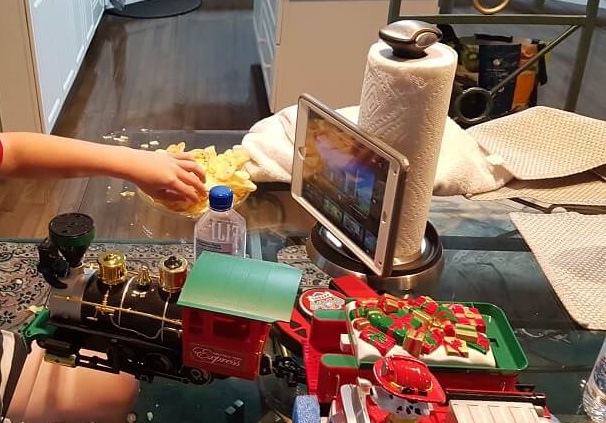DIR Expert Jackie Bartell returns this week to discuss how to provide expectations for children with developmental differences in order to foster independence and developmental progress in the Developmental, Individual differences, Relationship-based (DIR) model. I present a few challenges we are currently facing at home and Jackie coaches me on how to implement some straight-forward practices to provide some relief for our family.
Fostering independence with Jackie Bartell
I shared with Jackie that recently our son has figured out that he doesn’t have to listen anymore. Ha! Sounds very cute, but it also can bring some frustration as parents! I know that this is a good sign that he is making developmental progress, and that this sometimes comes with behavioural outbursts, but I still felt that I could use some good ol’ DIR coaching. Jackie to the rescue!
Jackie and I had spoken about this a couple of months ago informally and she gave me some great tips. However, despite discussing them with my husband and agreeing that we should implement them, we haven’t. As I listened to the last few podcasts, what Jackie was coaching me about began to sink in: Creating expectations for our son to help his regulation at home in the evenings. Jake Greenspan discussed this, Dr. Andrea Davis acknowledged how it’s hard for me to see my son distressed and it makes me want to do everything for him, and Dr. Feder talked about the more structured side of DIR/Floortime.
The Developmental Progression
Jackie says that I gave her a description of the observable behaviour: My son realized he doesn’t have to listen anymore. It’s a progression upwards developmentally we talk about in the DIR model. He is forming his sense of self, which is a celebration! He’s realizing he’s not completely dependent on Mom and Dad and that there’s give and take. Mom and Dad have certain ideas and he has to be part of those ideas. He has to understand that there’s reasons to the expectations that Mom and Dad have.
So how do we develop that capacity in our son to understand that there are ‘must-do’s’, ‘expectations’ and ‘choices’? Sometimes we follow the child’s lead but we also have times where we need to set limits and expectations. If we don’t allow for challenge, then we don’t allow that child to develop the capacities up to grey-area or triangular thinking. It’s important to think about not just in terms of having a happy family life, but also in terms of how to move up developmentally.
The Struggles
I told Jackie that we don’t have a problem setting up limits and expectations at home but it’s inconsistent. I brought up three issues to ask for coaching about: bedtime, brushing teeth, and treats–namely, chocolate. Bedtime doesn’t seem to be too difficult a process when Mom or Dad are home alone with our son. However, if we are both home, oh boy. Our son races around the house, protests loudly, gets silly and throws socks onto the curtains. He basically gets all wound up. He also protests brushing teeth quite a bit and we have to brush them for him. Mom and Dad brush in different ways as well. And finally, ever since Hallowe’en he has been interested in eating chocolate and candy everyday which we limit more or less, depending on the day!
Jackie suggests starting with the chocolate. As parents we have to determine in situations like this where our struggle is coming from. From a developmental perspective, it is great to see that our child finally understood Hallowe’en and embraced candy treats for the first time. But now we are trying to help him learn the limit.
Jackie says that our son is realizing that he has two parents and he is starting to understand that they are different from each other. He has learned that Mom’s a softie and Dad might not be. Sometimes he gets the chocolate, and sometimes he gets two, three, or four. When he protests, he escalates, gets loud, and it gets unpleasant. This wears us down. Jackie says he wears us down because he doesn’t know what the expectation is before he goes into it.
We know that the expectation is one piece of chocolate per day and that’s it, but he doesn’t know that. We need to involve him in how we are going to take control of his sugar intake so he understands the limit.
What to Do
Chocolates To begin to involve our son in setting the expectations for chocolate consumption, we can say, “Should we have one or three?” Then we can begin to negotiate whether that’s good. Then after dinner is done, he goes and gets one piece of chocolate and the limit is set. But if he doesn’t know the limit beforehand it’s going to be difficult to make our family compliant around that rule.
Jackie points out that it’s not manipulation when our son is trying to press the limits. He’s simply learning how to control his environment–in this case, his parents. We are the safest people. He will have to learn how to do this negotiation. So if he takes the whole bag of chocolates, you say, “Wait a minute! Didn’t we decide that it’s one?” You can say, “Well I’m sorry, but this is too many because we agreed on one.” Then I would simply take out one for him. If he screams or protests, that is ok!
Sometimes when we are triggered, it might slip out “Fine, then you don’t get any!” It comes out because we’re dysregulated at the notion of our child not participating in our idea. Our son doesn’t understand–nor should he–that Mom knows best and is looking out for his health. The behavioural response only imparts our frustration and doesn’t help him understand the expectation. When there’s an expected behaviour, it’s so important we let the child know what that is.
“Look! We have this much chocolate left and we have to decide how much we can have everyday. Do you think we should have one or three pieces? Let’s make a picture.” Maybe you have two pictures then when dinner is over, you pull out the chocolate pictures. Then you can say, “Go get your chocolates now and put one on each spot.” If he tries to get more, you say, “Wait a minute, only two!” If he keeps 15, you say, “I’m going to count to 5. If you can’t put them away by the time I get to 5, I’m going to help you.” Then put them back in there. If there’s an eruption, you help him co-regulate. But you won’t help him co-regulate by giving him 3 or 4 more pieces of chocolate.
It’s even fine if the limit of chocolates with Mom is different from what the limit is with Dad. As long as Mom and Dad agree on how much chocolate is ok for him to eat, the limits can be set. Jackie says to negotiate the parameters as parents and come across as a united front otherwise you will get the child knowing that one is softer than the other–which is wonderful, but might cause the parents strife! These are not problems. These are celebrations. Our son is learning about the world of human beings.
Bedtime I mentioned to Jackie that I don’t really like having to leave my own house so my son can go to sleep with his Dad without a huge production like it can be if we are both home. I know that this is not feeling ok for me as a member of this family. Again, Jackie says that we need to agree as parents that this is something that we want to change (not ‘fix’; it’s not broken). We have to figure it all out beforehand–not in the moment when it’s happening. Once we agree we’re going to change it, we need to lay out the expectations, “Here’s what we expect at bedtime.” We don’t lay them out at bedtime.
We can make a visual schedule and go through what we are going to do. You might just pick one aspect of the bedtime routine that is particularly challenging and set up a timer. You can say that if he doesn’t put on his pajamas by the time the timer is done, then we aren’t going to read a story, for instance. That is setting a limit. Then he knows what will happen. But Jackie says you have to be prepared to not read the story, even if he gets upset. It’s not going to change overnight.
You can go back to reference the expectations you lined up for him. You can create an “if…then…” that you can follow up on such as, “If you put your pajamas on by yourself I’ll read 3 stories. If you don’t, they’ll only be one.” If he protests the outcome, you co-regulate rather than remind him what he did incorrectly which won’t help him. Remember that he will be dysregulated because you are asking him to learn something new. It will not necessarily be easy for him. We have to be prepared for that beforehand, and we have to be able to keep our own regulation in check. We support our own regulation by making sure we’re not doing things and deciding in the moment.
All of us find ourselves in these places–not because we did something wrong. Things sometimes get out of hand and we have to reel things back in. It’s not bad parenting. It’s children evolving and growing while we stay in one spot as they’ve moved and we haven’t followed them.
Challenging our children
In our recent Floortime review with Dr. Andrea Davis, we covered how hard it can be for parents to challenge our children because it’s so uncomfortable for us to see them dysregulated. But we are their coach for the social world and our goal is that they can function in the world socially. Others aren’t going to do everything our child wants, so as the parent, I need to be the play partner who disagrees and gives him practice at negotiation. This is Floortime, but done in the context of the warm, nurturing relationship, respecting where the child is developmentally, individual sensory profile, and in a playful way.
I shared with Jackie a recent story of visiting my out-of-town parents with my son and lagging behind him in the morning one day. I came down to the kitchen to find him sitting at the table eating salt and vinegar chips for breakfast!
He had gone into the pantry, grabbed the big bag of chips, set his iPad up on the table with videos on, grabbed himself a glass salad dish from the high up cupboard, brought it to the table, and poured the entire contents of the bag into the plate, spilling many on the floor. He was as content as can be.
Jackie says this is a real moment for celebration! He knew that you start the day with food and figured out that here’s something I can get on my own and eat my breakfast! Jackie says that maybe he’s ready for Mom and Dad to sleep and he can get himself breakfast–something that he can do on his own. How amazing would that be for him?


When Parents Disagree
I asked Jackie how to handle disagreements between partners. In other words, how do I support my own regulation when my partner does something opposite to what we agreed upon in advance, for instance? Jackie says just pause and watch. Just like when we do Floortime we might be thinking in the moment that an activity will go one way but the child steers it in another way and we go along with it, so goes it with our partners. We have to have faith that why ever the other parent steered away from the plan, there’s a reason for it and respect that.
When the child sees the struggle between the parents, he thinks, “Yes! Now I have 5 more minutes!” Any way he can get a few more minutes is great to him. Helping parents play against each other is a great idea to him, which is a celebration for his development (however stressful for the family unit). Every parent is on their own timeline. Each parent has individual differences too which includes strengths and challenges. What’s easy for me is not as easy for my partner, and vice versa. Let’s just remember that both parents have the same end goal but how each spouse meanders towards it might be different, which can be very difficult.
One Step at a Time
Plant the intention in our head: Make things clearer for our son around chocolate, brushing teeth, and bedtime. The first time we’re going to do this, the entire night is free and this is all that’s planned. We just do one activity: the chocolate. Only when you have success there, you can move on to brushing teeth. If we try to modify everything all at once, we do nothing because we are just human beings too and because we can’t deal with the dysregulation ourselves.
Jackie corrected a statement I made earlier that we’re disorganized. She said, no it’s not that we’re disorganized. We’re finding ourselves in dysregulation. She suggests planning what our limits will be. Discuss in advance while regulated, and include him in the discussion. When we apply them, follow through with them. Work on one thing at a time. Don’t discuss it in the moment-let it go if we don’t follow our plan rather than trying to change things in the moment. Use reflective practice to review why it didn’t go as planned.
Thank you to Jackie for taking the time to coach me regarding our challenges around setting expectations for our son. If you have any constructive comments, questions or relevant examples, please consider sharing them below in the Comments section. If you found these strategies helpful and informative, please consider sharing our post on Facebook or Twitter!
Until next time… here’s to affecting autism through playful interactions!




